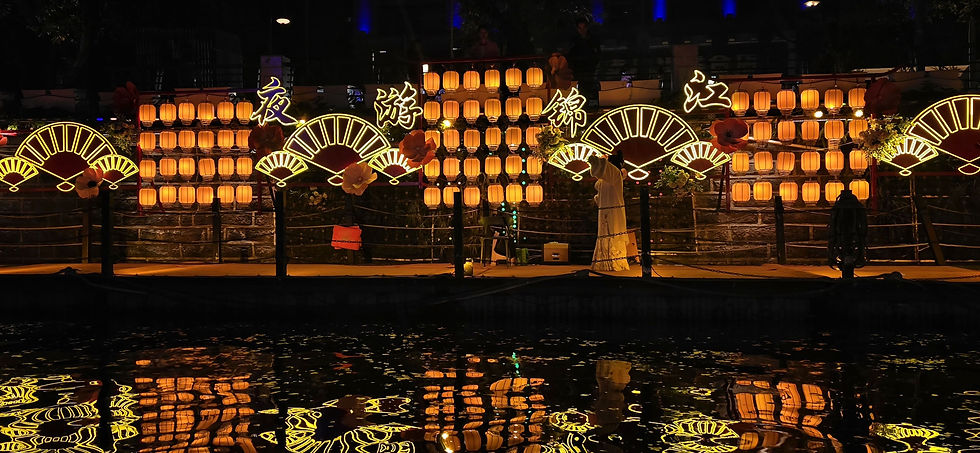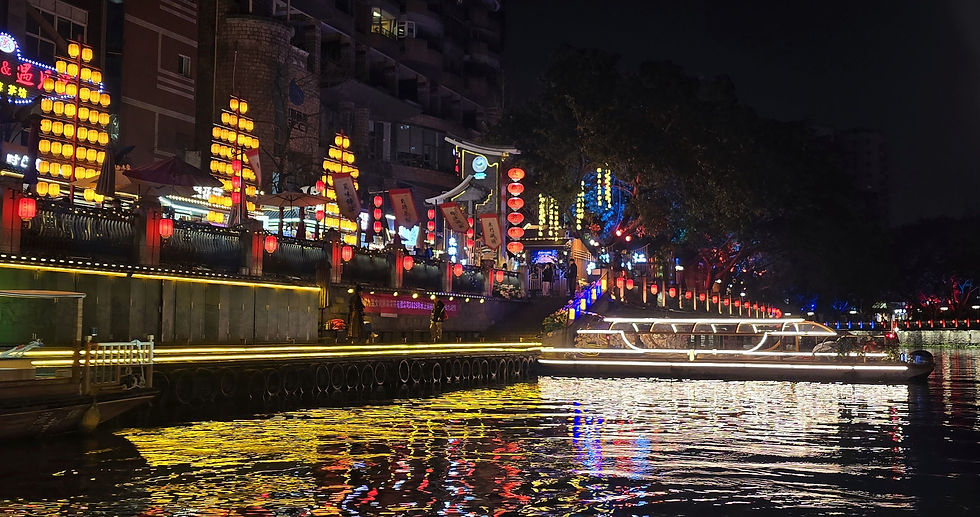Chengdu Night Cruise
- Shannon
- Sep 4, 2025
- 5 min read
Reflections of Old Sichuan
Glide along the shimmering Jin River as night falls over Chengdu, where vibrant city lights, ancient culture and tranquil waters blend into a magical evening experience. The Chengdu Night Cruise offers a unique perspective on this bustling city, illuminated landmarks, gentle river breezes and captivating performances combine to create an unforgettable journey after dark. Whether you’re seeking romance, culture or a peaceful escape, this cruise reveals Chengdu’s charm in a whole new light.

Chengdu’s origins date back to the 4th century BC when it was founded by the Kingdom of Shu, an influential state during the turbulent Warring States period of ancient China. Situated along the Jinjiang River, Chengdu quickly became a vital hub at the crossroads of three major trade corridors that connected the region to the wider Silk Road network. This strategic position not only bolstered the city’s economic importance but also fostered a rich cultural and intellectual life. The fertile plains irrigated by the Jinjiang allowed agriculture to flourish, supporting a dense population and enabling Chengdu to grow as a political and commercial centre. The city’s role was further solidified in 316AD, when under the Qin Dynasty it was designated as the capital, underscoring its growing prominence in Chinese history.
Throughout its early history, Chengdu was no stranger to conflict, notably during the chaotic collapse of the Western Jin Dynasty. In the early 4th century, the city endured invasions and power struggles between competing warlords and invading nomadic tribes. One of the most significant upheavals was the Disaster of Yongjia in 311AD when northern China fell to non-Han rulers, pushing refugees and loyalist forces southwards into Sichuan. Chengdu’s fortified location and surrounding mountains made it a defensible refuge during these turbulent times. Later, during the Three Kingdoms period (220–280AD), Chengdu served as the capital of the Shu Han kingdom, one of the three rival states vying for control of China. The city’s role as a military and political stronghold was immortalised in classical Chinese literature, particularly the “Romance of the Three Kingdoms,” which dramatises the strategic battles and alliances centred around the region.

The Chinese people have mastered the art of flute playing over the past 9000 years. Xiao bone flutes are the oldest wind instruments in the world
By the 13th century, Chengdu had evolved into a vibrant urban centre renowned not just for commerce but also for its cultural contributions. Marco Polo, the Venetian explorer, noted Chengdu’s numerous bridges in his accounts, with the Anshun Bridge among the most famous. The name Anshun, meaning “peaceful and fluent,” reflects the city’s aspiration for harmony and prosperity. Though the original structure was rebuilt multiple times, the current Anshun Bridge, reconstructed in 2003, functions as a popular riverside restaurant and cultural landmark. These bridges symbolise Chengdu’s blend of natural waterways and human engineering, facilitating trade and daily life along the Jinjiang River. The river itself, known locally as the “Mother River,” has for over 2300 years been a lifeline for Chengdu, supporting agriculture, transportation and commerce that shaped the city’s identity.
Chengdu’s association with the giant panda, China’s national treasure, further enriches its historical and cultural tapestry. The mountainous bamboo forests of Sichuan province provide a natural habitat for these rare creatures, and Chengdu is at the forefront of global panda conservation efforts. The city hosts several research and breeding centres dedicated to preserving the species, intertwining environmental stewardship with cultural pride. This connection adds a unique dimension to Chengdu’s international reputation and highlights its role in balancing modern development with ecological responsibility. Visitors often pair cultural exploration with visits to these panda sanctuaries, experiencing firsthand the harmony between Chengdu’s urban vibrancy and its natural heritage.
Culinary innovation is another cornerstone of Chengdu’s enduring legacy. Famous for its fiery, bold and complex flavours, Sichuan cuisine is celebrated worldwide and in 2011, UNESCO officially designated Chengdu as a City of Gastronomy. With over 15000 eateries ranging from humble street stalls to elegant fine dining, the city offers an unparalleled gastronomic experience that reflects centuries of culinary evolution. This culinary richness stems from the region’s diverse agricultural resources, including the widespread use of Sichuan peppercorns and chili peppers that create the signature “mala” (numbing-spicy) sensation. Food is deeply embedded in local culture, festivals and daily life, serving as a social glue that connects Chengdu’s vast population of over 21 million residents.

Today, Chengdu harmonises its ancient heritage with rapid modernisation, offering visitors immersive experiences such as the Chengdu River Night Cruise along the Jinjiang River. This serene journey showcases the city’s spectacular riverside skyline illuminated by modern lights, alongside historic sites like the Wuhou Shrine, a memorial dedicated to the famed strategist Zhuge Liang of the Shu Han era. The night cruise captures the essence of Chengdu as a city where the past and present coexist gracefully, offering a unique vantage point from which to appreciate its rich cultural narrative. As one of China’s leading economic, research and cultural centres, Chengdu continues to thrive, bridging its illustrious past with a dynamic future.

🗺️ Location
Dongmen Wharf, Binhe Road, Jinjiang District, Chengdu, Sichuan Province, China
🚆 How to get there
To reach Dongmen Wharf, you have a couple of convenient options depending on your preference and schedule. The most straightforward way is to book a Didi ride from your hotel, which offers a comfortable, direct and hassle free journey straight to the wharf without the need to navigate public transport or walk long distances. Alternatively, if you prefer to experience the city’s efficient metro system or want to save on transportation costs, you can take the metro to Dongmen Bridge Station. Upon arrival, use Exit D, which leads you within easy walking distance of Dongmen Wharf. The metro is a reliable, quick option that also allows you to observe local life and avoid potential traffic delays, making it a practical choice for many visitors.
⭐ Attraction Info
The Chengdu night cruise operates year round every evening between 7pm - 10pm, offering a picturesque way to experience the city’s illuminated riverside views. Tickets are priced at ¥80 per person and can conveniently be purchased at the ticket counter located right next to the boats. Payment is accepted via Alipay, making the transaction quick and easy. The entire cruise lasts approximately 40 minutes for a round trip, providing ample time to soak in the stunning skyline and cultural landmarks reflected on the water. As the temperature tends to drop in the evening, especially on the open deck, it’s important to dress warmly to stay comfortable throughout the journey. For safety, life jackets are provided on board and are required to be worn by all passengers during the cruise.
成都夜游

Thanks for reading about Chengdu Night Cruise. Check out more awesome destinations here!
















